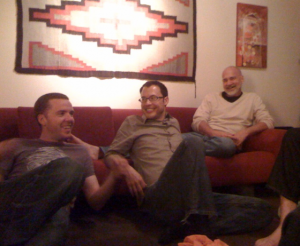First up, Jayson Gaddis, the man who made it all happen.
Is Men’s Work Dying? Or Does it Just Need an Extreme Makeover?
“Men’s work” as I know it is dead.
WTF? Seriously? C’mon, I just let go of another identity a few months back. Again?
This past weekend 40 men’s leaders and 6 women answered the call to be a part of the Evolving Men’s Conference. The context? Some of us thought it was to “evolve masculinity.” For others, the hope was to plan a bigger conference next year. Others didn’t know what the context was.
I visioned this conference with a few very bold expectations (the other men had their own wants as well, some the same, some different. These were just mine).
- I wanted to get male leaders to collaborate.
- Originally I wanted a bigger conference in 2011 but many folks told me to drop this pre-conference and see what the other men wanted. I acquiesced.
- I wanted to have us birth a single, new masculine paradigm that we could all rally around and get behind.
- I wanted us to evolve masculinity in a tangible way.
- I wanted women to help us with this bold agenda.
- I wanted to share how the deep feminine would be pivotal in the new masculine way moving forward.
Number 1 and 5 were the only expectations that were met. The rest were dropped. As Bill Harryman said in an email to me: “it wasn’t at all what I wanted or expected, but it was EXACTLY what I needed.” And further, I would add, I think almost everyone received what they needed, and not necessarily what they wanted.
We had lively discussions about the masculine and feminine within us and outside of us. We engaged in conflict, told the truth, held back, cried, laughed, danced, listened deeply, co-created, did business, and finally took some action.
What emerged was far better than what I had hoped for. Without giving you the blow by blow, here are some highlights and what I believe is emerging . . .
Read the rest of the post. This was also posted at the Evolving Men's Conference site.
Graham Phoenix of the Male eXperience blog, and a very kind and passionate man, has put up two posts about the weekend. He came all the way from Spain for the conference - that's cool.
Evolving Men??
I feel excited, inspired, challenged, educated, sad, unnerved and really tired/jetlagged. No, I’ve not been partying, I’ve been to the Evolving Men’s Conference 2010 in Boulder, CO.
It is truly amazing when 40+ men, with a sprinkling of women, get to together to talk about men. For two days in Boulder we talked, went into our inner selves, argued and felt the space together. Many of us had not met each other, had not heard of each other’s work. There were revelations and disagreements, moving forward and going off at tangents, but whatever happened, there was growth and development, well for me at least!.
Read the whole article.
Power through Polarity
So why am I so angry, what’s the matter with me. I’ve just been to a great weekend in Boulder, CO, spending two days talking to men about men. Yes, I’m tired, yes, I’m jetlagged, but there is more to it than that. I’m simply pissed off that there are so many men doing work for men, without any apparent effect.
OK, we all influence a few people, in some cases some influence lots of people, but it’s having no apparent effect. Men out in the world remain in fear and confusion.
Read the whole article.
Finally, David Cates, a member of Jayson's team for the event, has a couple of posts.
Read the whole post.Toppling The Monolithic “Ideal Man”
Recovering from an intense, rocky, miraculous weekend at the Evolving Men’s Conference in Boulder. I went expecting a unified vision to emerge, and collective action. Apparently so did most of the other leaders who had gathered.
What we got instead was the truth: In 2010, there are as many ways to be a man as there are men.
The men’s movement came of age in the 80s, the era of corporate conglomeration. We are living in a very different reality today.
In the internet age, what seems to work is micro-niches in a loosely woven network. Diverse voices. Diverse truths. Wildly different approaches.
What do I, a white American boomer, have to say to a young Latino man? Turns out, not much. Honestly, if I turn it around, how much of my worldview do I get from hip-hop – or for that matter, from big-band swing?
Every tribe has its own voice and values.
So how do we proceed?
Guys, the google search term ain’t “Men’s Work”
“Men’s Work” is a tool-belt full of bizarre-looking tools that the guy on the street can see no use for. Good luck selling it to anyone but workshop geeks.“Process”… “Quest”… “Authenticity”… “Communication”… “Truth-telling”… “Inner Masculine/Feminine”… “Weekend Workshop”… “Initiation”… “Brotherhood”… blahblahblah…
WE may know what these tools are… but to most men, they’re awkward and intimidating jargon.
Wait till a man’s ready to build: a home, a family, sex, a career, money, community, a stairway out of his pit. Meet him in the real world. Address his desires and dreams.
THEN suddenly those tools gain value. Not because he wants the tools themselves… but because he wants to build something.
Focus on that SOMETHING… and you’ll have his full attention.
Read the whole post.
Tags:















Wed, Sep 29, 2010